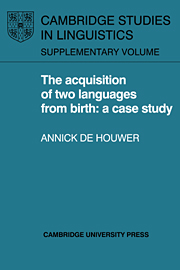Book contents
- Frontmatter
- Contents
- List of tables
- Symbols and abbreviations
- Acknowledgements
- 1 Introduction
- 2 Bilingual first language acquisition: methods and theories
- 3 A new study of bilingual first language acquisition: aims and hypotheses
- 4 Case study of a bilingual child: introduction
- 5 Language choice and Mixed utterances
- 6 The noun phrase
- 7 The verb phrase
- 8 Syntactic analysis
- 9 The morphological and syntactic analyses: a recapitulation
- 10 Metalinguistic behaviour
- 11 Findings and implications
- References
- Appendix
- Index of names
2 - Bilingual first language acquisition: methods and theories
Published online by Cambridge University Press: 17 August 2009
- Frontmatter
- Contents
- List of tables
- Symbols and abbreviations
- Acknowledgements
- 1 Introduction
- 2 Bilingual first language acquisition: methods and theories
- 3 A new study of bilingual first language acquisition: aims and hypotheses
- 4 Case study of a bilingual child: introduction
- 5 Language choice and Mixed utterances
- 6 The noun phrase
- 7 The verb phrase
- 8 Syntactic analysis
- 9 The morphological and syntactic analyses: a recapitulation
- 10 Metalinguistic behaviour
- 11 Findings and implications
- References
- Appendix
- Index of names
Summary
The study of children growing up with two languages from birth is comparatively new. As with any new area of investigation, there is an initial period for seeking a satisfactory method and paradigm in which to carry out valid work. This initial period is now perhaps starting to fade away: the clearest sign of this is that in general books on bilingualism, reference is made to findings from studies on young bilingual children in which these findings are presented as facts and generally accepted truths (see e.g. Grosjean 1982). Another sign is that scholars in first language acquisition are also starting to refer to findings from studies of young bilingual children (see e.g. E. Clark 1985). A third sign is the recent publication of various books on bilingual children aimed at answering parents' and other educators' questions on how to bring up children bilingually (see e.g. Kielhöfer and Jonekeit 1983, Arnberg 1987, Harding and Reilly 1987, Saunders 1988). In these books, findings from fundamental research are often quoted or taken as starting points for practical advice to parents and teachers.
The question now is: can indeed most of the findings from the available studies be taken as proven, unquestionable facts? Is there consensus in the field about these findings and how to interpret them? In other words, has a unified research paradigm developed that is methodologically sound enough to address theoretically pertinent issues?
It is the aim of the first part of the present chapter to examine the latter question.
- Type
- Chapter
- Information
- The Acquisition of Two Languages from BirthA Case Study, pp. 9 - 64Publisher: Cambridge University PressPrint publication year: 1990



